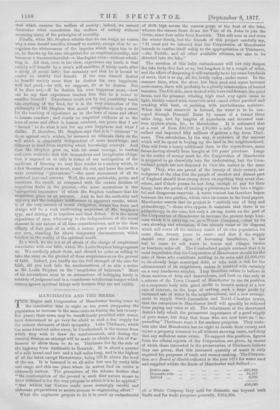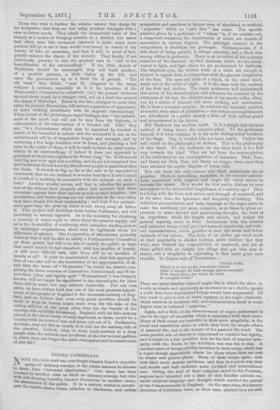MANCHESTER AND THE ME11E8.
THE Mayor and Corporation of Manchester having come to the conclusion that in eight or ten years (supposing the population to increase in the same ratio as during the last twenty- live years) their town may be insufficiently provided with water, have determined to go very far afield to seek a due supply for the unborn claimants of their sympathy, Lake Thirlmere, which lies some hundred miles away, in Cumberland, is the source from which they wish to draw the reinforcement, and during the ensuing Session an attempt will be made to obtain an Act of Par- liament to allow them to do so. Thirlinere lies by the side of the highway from Arnbleside to Keswick. It is about a quarter of a mile broad and two and a half miles long, and is the highest of all the lakes except Haweswater, being 533 ft. above the level of the sea. It is hemmed in on all sides but one by rocky hills and crags, and this one place where its waters find an outlet is extremely narrow. The promoters of the scheme declare that "the conformation of the ground is such that nature seems to have ordained it for the very purpose to which it is to be applied," "that seldom has Nature made more seemingly careful and elaborate preparations to secure success to engineering effort."
What the engineers propose to do is to erect an embankment of 60ft. high across the narrow gorge at the foot of the lake, whence the stream flows down the Vale of St. John to join the Greta, some four miles from Keswick. This will hem in and store the winter floods', but the friends of this project carefully say, "It must not be inferred that the Corporation of Manchester intends to confine itself solely to the appropriation of Thirlmere, —the Naddle, and all other available streams, are also to be diverted into the lake."
The erection of this lofty embankment will not only deepen the lake forty-five feet or so, but lengthen it by a couple of miles, and the effect of deepening it will naturally be to lay some hundreds of acres, that is to say, all the lovely valley, under water. In the summer time, when the store has been used and water becomes ID ore scarce, there will probably be a ghastly resurrection of buried beauties. The fell-aide, once decked with trees and flowers, the quiet farina, and the pleasant winding high road, may again come to light, thickly coated with reservoir-mud—mud either parched and cracking with heat, or ,seething with unwholesome moisture. When this vast reservoir is formed, the water is to be con- veyed through Dumnail Raise by means of a tunnel three miles long, and by lengths of aqueducts and inverted cast- iron syphon-pipes, &c., to Manchester. It is estimated that at a cost of from 160,000 to 100,000 a mile that town may collect and impound fifty millions of gallons a day from Thirl- mere, This calculation, by the way, is exclusive of the amount which will be spent in buying up the land in the neighbourhood. This will form a heavy additional item in the expenditure, some farms having already been bought at 100 years' purchase. Large as the outlay of money must be, the Corporation of Manchester is prepared to go cheerfully into the undertaking, but the Cum- berland people are not disposed to view the matter in the same light. They, who are proud of the beauty of their county, are indignant at the idea that the people of another and distant part of England should thus swoop down on anything they covet else- where, and if their purses be but long enough to pay for their fancy, have the power of turning a picturesque lake into a fright- ful and dangerous reservoir. A warm contest has therefore begun between the two parties, which runs its course in the local papers. Manchester asserts that its project is "entirely one of duty and philanthropy,"—those who oppose it maintain that there is no philanthropy in the case, but only a strong desire on the part of the Corporation of Manchester to Weser's° the present large busi- ness, which it is carrying on as a Water Company,—that by its own showing and admission, it has already water at its disposal which will cover all the sanitary wants of its own population for more than twenty years to come ; and that if the supply should ever show signs of becoming insufficient, it has but to cease to sell water to towns and villages twelve or fourteen miles off. The Cumberland people contend that it is most improbable that the Corporation of Manchester should for the sake of those who contribute nothing to its rates add £3,000,000 to its already large municipal debt, or take such a risk for the advancement of it neighbours, unless it counted with certainty on a very handsome surplus. They therefore refuse to believe in these motives of duty and benevolence, and look on this only as a scheme of the Town Council of Manchester to use its position as a corporate body with good credit to borrow money at a low rate of interest, in the hope of making such a large profit by increased sale of water in the neighbourhood, and a new arrange- ment to supply South-Lancashire and North-Cheshire towns, that the ratepayers in Manchester itself will speedily be relieved from paying any rates at all, The inhabitants of the threatened district fully admit the paramount importance of a good supply of pure water, but deny that those who are now bent on " im- pounding" Thirlmere want it for sanitary purposes. They main- tain also that Manchester has no right to invade their county and injure a property common to all without showing cause, and deny that any sufficient cause existe. To support this position, figures from the official reports of the Corporation are given, by means of which those interested in the preservation of Thirlmere believe they can prove, that this increased quantity of water is only required for purposes of trade and money-making. The Corpora- tion es a Board of Health collected in the year 1874 for water used and supplied within the limits Of Manchester and Salford :- Public rata Domestic rato
Salford 0 £22,468
... 24,510007
£513,165
As a Water Company they sold for domestic use beyond such limits and for trade purposes generally, £102,268. Those who wish to further the scheme answer this charge by the declaration that they are but using prudent foresight with a view to future needs. They admit the commercial value of fine scenery as a means of bringing tourists to a district, but assert that when once this enormous reservoir is made, many more persons will go to see it than would ever travel in search of any beauty of lake or mountain, and that it will, in point of fact, greatly enhance the charm of the scenery. They kindly, if not judiciously, promise to take the greatest care to "add to the beautification of the surroundings." If the little church of Wythburn should be submerged, they will build another, of a prettier pattern, a little higher up the hill, and carry the gravestones up to a fresh bit of ground. "The old road," they think, "may be relegated to the deeps without a murmur, especially as it is the intention of the Waterwork's Committee to substitute [sic] the present tortuous up-and-clown track by a straight road, cut on a level line around the slopes of Helvellyn. Below it, the lake, enlarged to more than twice its present dimensions, will assume a grandeur of appearance in more striking accordance with its majestic surroundings." These lovers of the picturesque regret feelingly that "the embank- ment at the north end will not be seen from the highway, in consequence of the intervention of a wooded hill. This," they say, "is a circumstance which may be regretted by tourists in search of the beautiful in nature and the wonderful in art, as the embankment will be of stupendous height and strength, and by scattering a few large boulders over its front, and planting a few trees in the midst of them, it will be made to have an exact resem- blance to its surroundings, if indeed it does not approach in grandeur to its proud neighbour the Raven Crag," &c. It all sounds very big and very ugly and revolting, and we are not surprised that the Cumbrians do not want the Manchester people to paint their lilies for them. It sounds so big, so far as the stun to be expended is concerned, that we are inclined to wonder how far a Town Council is justified in saddling its successors with the interest on such a loan ? Another wonder occurs, and that is, whether the promo- ters of the scheme have properly taken into account that these mountain regions have their terrors as well as their beauties ; that inundations and water-spouts are not unknown in the very valley they have chosen for their undertaking ; and that if the embank- ment gave way, the pent-up water would sweep away all before it. This project will doubtless come before Parliament, and will inevitably be warmly opposed. As to the necessity for obtaining • a quantity of water equal to three times the present supply, and as to the desirability of conferring such extensive trading powers on municipal corporations, there may be legitimate room for difference of opinion. The Corporation of Manchester probably believes that it will be able to satisfy a Parliamentary Committee on these points, but will it be able to satisfy the public at large that water cannot be had elsewhere, with less sacrifice of beauty, or still more difficult task, that there will be no sacrifice of beauty at all? It must be remembered, too, that this appropria- tion of one lake will be the forerunner of the appropriation of all, and that the name of " Westmaria," by which the district com- prising the three counties of Lancashire, Cumberland, and West- moreland (then and rightly spelt " Westmerland ") was formerly known, will no longer be significant to the etymologist, for lakes there will be none, but only hideous reservoirs. For our own parts, we have always held that one of the most precious inherit- ances of the people of England is the mountain-scenery of Eng- land, and we believe that even very great sacrifices should be inado to keep its beauty intact, more even for the sake of the toiling millions of our great cities than for the benefit of the country-side specially threatened. England, with its lake-scenery placed at the cruel mercy of such improvers as these, would be a country with its heart of rest and peace cut out of it. Parliament, we hope, may see this as clearly as it will see the sanitary aide of the question, Indeed, what is more truly sanitary to a busy people than the solitude and loveliness of the few natural gardens
in which they can forget the thick atmosphere and incessant noise of city life ?































 Previous page
Previous page